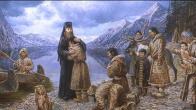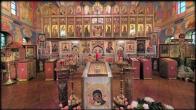2025.06.24. The Gospel of John. Discussions with Metropolitan Jonah (Paffhausen). Part 1
2025.06.24. The Gospel of John. Discussions with Metropolitan Jonah (Paffhausen). Part 1
Subscribe: https://youtube.com/StJohnDC?sub_confirmation=1
The Gospel of John, Part 1
Introduction / Historical Context
Talk by Metropolitan Jonah (Paffhausen)
June 24, 2025
Description:
Metropolitan Jonah introduces the Gospel of John, especially its historical context as understood by modern scholarship. Note: These are not Church teachings, which focus on a spiritual / religious understanding of the text. Topics include:
(1) The Hebrews vs. the Jews and the context of the radical Deuteronomic reforms of Josiah. These reforms: removed the idea of a multi-personal God, especially eliminating the former place of the Holy Spirit / Wisdom in the first Temple religion; rejected angels, judgement and eternal life; effectively eliminated the Day of Atonement, combining it into a morphed Passover; and, almost of necessity for the Babylonian exiles, removed Kingship (no more chrism) and Priesthood (i.e., sacrifice), and emptied the Holy of Holies of the showbread (bread and wine, prefiguring the Eucharist). The resulting Judaism is a stripped-down rabbinic, scriptural religion, akin to Protestantism, not the liturgical religion of the First Temple, which finds its fulfillment in the Orthodox Church (OC). Judaism is more Talmudic than Torah-based and is quite blasphemous against Christianity. Despite all this, King Josiah is a saint in the OC and undoubtedly did remove some pagan aspects that had crept into the Hebrew religion;
(2) The Gospel of John reflects a strong Hebrew point of view and takes a very negative view of the Judaism of the Second Temple. It is the most polemical against Judaism of the four Gospels.
(3) The Gospel of John is preeminent in the OC. It is not chronological, but predominantly a record of Christ's teachings;
(4) The Orthodox view of the Old Testament, and the Septuagint vs. the Masoretic text. Most importantly, the Old Testament is not a precise history, but a spiritual history, and has very likely been edited by the Deuteronomic reformers;
(5) Jesus made a radical critique of Judaism, denouncing it and seeking to bring back the true Hebrew religion [of which He is the fulfillment];
(5) The Essenes, Sadducees and Pharisees;
(6) The Orthodox Church is simple, basic Christianity from the Apostolic times. It is the only stable Church.









